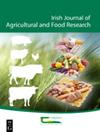Potatoes in Ireland: Sixty years of potato research and development, market evolution and perspectives on future challenges
IF 1.4
4区 农林科学
Q3 AGRICULTURE, MULTIDISCIPLINARY
引用次数: 2
Abstract
Potato is often considered synonymous with Ireland, due to the great Irish famine in 1845, and remains the most important primary food crop in Ireland. Over the last 60 yr, the area of potatoes has reduced from 86,000 ha to 9,000 ha. This trend has occurred in most developed countries but in Ireland it is due to decreasing consumption, increasing yield, decline in seed production and potatoes no longer being use for animal feed. Significant specialisation occurred in the industry during the 1990s, with improvements in agronomy, on farm investment in storage and field equipment, consolidation of packing facilities, and a significant shift in cultivar choice, with Rooster becoming the dominant cultivar. These developments led to an increase in yield from 20 t/ha in the mid-1980s to over 40 t/ha today. Potato research in Ireland has focused on breeding, pathology and agronomy, while there have been significant changes in how knowledge is communicated to growers and the industry in this period. The industry faces many challenges in the future, largely framed by climate change, the need to reduce fertiliser and plant protection products as part of the EU Farm to Fork Strategy and industry size constraints. New superior potato varieties and novel breeding techniques will have potential to help address many challenges in combination with integrated pest management principles. Multi-actor approaches will be necessary to address all challenges but particularly to aid the industry grow and exploit emerging opportunities.爱尔兰的土豆:60年的土豆研发、市场演变和对未来挑战的展望
由于1845年爱尔兰大饥荒,土豆经常被认为是爱尔兰的代名词,它仍然是爱尔兰最重要的主要粮食作物。在过去的60年里,土豆的面积从86000公顷减少到9000公顷。这种趋势在大多数发达国家都发生过,但在爱尔兰,这是由于消费减少、产量增加、种子产量下降以及土豆不再用作动物饲料。20世纪90年代,随着农学的改进、对储存和田间设备的农场投资、包装设施的整合以及品种选择的重大转变,该行业出现了重大的专业化,公鸡成为主导品种。这些发展使产量从20世纪80年代中期的20吨/公顷增加到今天的40多吨/公顷。爱尔兰的马铃薯研究重点是育种、病理学和农学,而在这一时期,向种植者和行业传达知识的方式发生了重大变化。该行业未来面临许多挑战,主要是受气候变化、作为欧盟农场到餐桌战略的一部分减少化肥和植物保护产品的必要性以及行业规模限制的影响。新的优质马铃薯品种和新的育种技术将有潜力结合病虫害综合治理原则来帮助解决许多挑战。为了应对所有挑战,尤其是为了帮助该行业发展和利用新出现的机会,有必要采取多方面的方法。
本文章由计算机程序翻译,如有差异,请以英文原文为准。
求助全文
约1分钟内获得全文
求助全文
来源期刊
CiteScore
2.50
自引率
20.00%
发文量
23
审稿时长
>36 weeks
期刊介绍:
The Irish Journal of Agricultural and Food Research is a peer reviewed open access scientific journal published by Teagasc (Agriculture and Food Development Authority, Ireland). Manuscripts on any aspect of research of direct relevance to Irish agriculture and food production, including plant and animal sciences, food science, agri environmental science, soils, engineering, buildings, economics and sociology, will be considered for publication. The work must demonstrate novelty and relevance to the field of research. Papers published or offered for publication elsewhere will not be considered, but the publication of an abstract does not preclude the publication of the full paper in this journal.

 求助内容:
求助内容: 应助结果提醒方式:
应助结果提醒方式:


